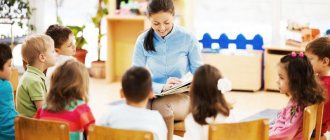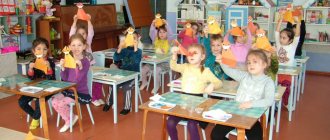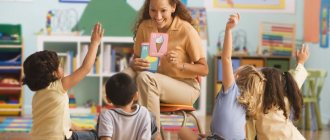Program for interaction between family and preschool educational institutions at the present stage
- November 11, 2012
Competition “My Pedagogical Initiative - 2012”
Nomination “Methodological work in preschool educational institutions”
Today, a new system of preschool education is being established in society. On November 23, 2009, by Order of the Ministry of Education and Science of the Russian Federation No. 655 (registered by the Ministry of Justice of Russia on February 8, 2010 No. 16299), federal state requirements for the structure of the basic general education program of preschool education (hereinafter referred to as FGT) were approved.
The concept of modernization of Russian education emphasizes the exclusive role of the family in solving the problems of educating the younger generation. Recognition of the priority of family education requires other forms of interaction between family and kindergarten.
The interaction between kindergarten and family is one of the priorities in the work of the Municipal Preschool Educational Institution Child Development Center - Kindergarten No. 10 in the city of Alekseevka, Belgorod Region. Since teachers play a certain role in establishing partnerships, this is not the first year that kindergarten has included the task of working with families in the annual plan. And this gives positive results - teachers began to more often use non-traditional forms in working with children: tea parties, joint craft competitions, creativity marathons. But not all teachers easily switch to new forms of work.
For the last three years, a club for parents has been operating at the base. This form of working with parents is more effective and efficient than the parent meeting. Throughout the year, holidays and entertainment in the pool and musical matinees are held for parents. The annual holding of sports competitions “Dad, Mom, Me – a Sports Family” has become a good tradition of the kindergarten. We involve parents in helping to improve the territory and replenish the subject-development environment. But, along with the positive dynamics, the analysis of the interaction between the preschool educational institution and the family showed significant shortcomings in the work:
- The content of parent meetings and consultations is not sufficiently differentiated.
- When interacting with a student’s family, the capabilities and conditions of specific families and their interests are not taken into account.
- Not enough parents are involved in the work of preschool educational institutions.
After assessing parents’ satisfaction with the work of preschool educational institutions, it was decided to provide a meaningful description of their priorities in pedagogical literacy, and the results of the survey showed that the leading motives for increasing their pedagogical literacy are: increasing the level of psychological and pedagogical knowledge; solving problems of upbringing and education of children.
Thus, the analysis indicates the need for innovations in cooperation with parents. It is necessary to develop and implement a work system for the active inclusion of parents in the management of preschool educational institutions. All this allows us to consider working with parents as one of the pressing problems of preschool educational institutions at the present stage of modernization of the education system.
The socio-economic transformations characteristic of Russia in recent years have dramatically changed the goals and objectives facing education. The processes of democratization in the education system, its variability, and innovative programs have determined the need to find solutions to the problems of interaction between kindergarten and family, and to create conditions for improving the pedagogical culture of parents. During the research, the following contradictions :
- Between the rights and responsibilities of parents and the inability to use them.
- Between the need of parents for educational services and the lack of conditions for their provision.
- Between the low level of pedagogical culture of parents and the lack of a system for teaching them in kindergarten.
- Strengthening and developing close connections and interaction between various social institutions provides favorable living conditions and upbringing of a child, forming the foundations of a full-fledged, harmonious personality.
At the present stage, the basis for the joint activities of kindergarten and family is the following principles :
- Parents and teachers are partners in the upbringing and education of children.
- A common understanding by teachers and parents of the goals and objectives of raising and educating children.
- Help, respect and trust in the child, both from teachers and from parents.
- Constant analysis of the process of interaction between family and kindergarten, its intermediate and final results;
The Law “On Education” of the Russian Federation states that parents are the first teachers. They are obliged to lay the foundations for the physical, moral, intellectual, and personal development of the child. Working with parents is a complex and important part of a teacher’s activity, including increasing the level of parents’ pedagogical knowledge, skills, and teachers’ assistance to parents in family education.
Our proposed concept for the program of interaction between preschool educational institutions and families is developed in accordance with the following principles:
- The concept reflects the main directions of state policy in the field of education in accordance with the Law of the Russian Federation “On Education”, with the regulatory documents of the education department of the municipality, the Charter of MDOU d/s No. 10;
- The concept covers such aspects of improving preschool educational institutions as: educational and educational; scientific and methodological; organizational and managerial.
The initiative in establishing interaction with the family and the qualified implementation of the tasks of this interaction determines the guiding role of the preschool institution in family education. The most important way to implement cooperation between teachers and parents is to organize their joint activities, in which parents are not passive observers, but active participants in the process, that is, the inclusion of parents in the activities of preschool educational institutions.
Main priorities and directions of the program:
1. Unity in the work of the kindergarten and family in the upbringing and education of children.
2. Mutual trust in the relationship between teachers and parents, understanding of the needs and interests of the child.
3. Establishing correct relationships based on friendly criticism and self-criticism.
4. Mutual assistance in working together to educate preschoolers.
5. Studying the best experience of family education, promoting it among a wide range of parents, using the positive experience of family education in the work of the kindergarten.
6. Involving parents and the public in the activities of preschool educational institutions and in working with families.
7. Creating favorable conditions for increasing the pedagogical and psychological literacy of parents in the upbringing and education of preschool children.
8. Involving parents of “disorganized children” of the district in cooperation with preschool educational institutions.
9. Pedagogization of the preschool educational institution region.
10. Creation of a package of regulatory documents ensuring the rights of children.
Program events.
Priority activities with parents:
1. Social anemnesis of the family.
2. Drawing up and filling out a socio-demographic family passport.
3. Questionnaire to identify the level of teaching capabilities of parents.
4. Analysis of socio-pedagogical factors in family education of children.
5. Analysis of types of families of pupils.
6. Determination of parenting styles in the family.
7. Determination of the pedagogical competence of parents
Priority activities with teachers:
1. Questionnaire for educators “My pros and cons” in communicating with parents.
2. Test surveys of teachers.
3. Self-analysis of the behavior of a collective meeting with parents.
Methods of involving parents in the activities of preschool educational institutions:
Stage I: updating the needs of parents in the field of education of their own child.
Stage II: pedagogical education of parents as customers for educational services in preschool educational institutions.
Stage III: partnership between teachers and parents in the activities of preschool educational institutions, which is based on the ideas of humanizing relationships, the priority of universal human values with an emphasis on a personal-active approach.
Basic blocks for working with parents
| Blocks | Main goals | Forms |
| Pedagogical education of parents | Increasing the pedagogical competence of parents | Lectures, seminars, workshops, parent meetings, consultations, conferences and so on |
| Inclusion of parents in the activities of preschool educational institutions | Creating conditions for the inclusion of parents in planning, organizing and monitoring the activities of preschool educational institutions | Competitions, clubs, contests, quizzes, joint events, open days |
Algorithm for interaction with family:
Stage I. Searching for contacts at the first meeting - the teacher must show high pedagogical tact, sincere respect for parents, delicacy, restraint, it is important not to push away with ill-considered questions.
Stage II. It is discussed what is necessary to develop and educate a child, to emphasize his individuality and uniqueness. At this stage, you can already carefully talk about unwanted manifestations in the baby’s behavior.
Stage III. Establishing general requirements for raising a child. The teacher encourages parents to express their views on raising a child, to listen to the parents’ opinion about the methods they use, even if it is wrong. He does not refute, but offers his own methods of influence, calls for joint efforts to develop common demands.
Stage IV. Strengthening cooperation in achieving a common goal. Having agreed to joint cooperation, the parties clarify each other’s educational capabilities and set common goals and objectives. Disputes and disagreements are possible. It is important that they do not interfere with further cooperation.
V stage. Implementation of an individual approach. The teacher does not demonstrate his omnipotence, but confidentially communicates his doubts and difficulties, asks for advice from parents and listens to them. At this stage, a number of agreed measures are developed, including the re-education of the child.
VI stage. Improving pedagogical cooperation. Ready-made recipes are not offered; the process of joint activities is carefully analyzed. This is the stage of development of pedagogical cooperation, where common pedagogical influences are being implemented.
The initiator of contact is always the teacher!
Specific expected results:
At the final stage of introducing the program into the work of the kindergarten, it will provide an opportunity to activate parents, which will contribute to the establishment of a dialogue between the preschool educational institution and the family. This will provide an opportunity to form an active parental position, update acquired knowledge, and help parents look at specific situations through the eyes of their children and understand them.
The program will help to understand the attitude of teachers towards cooperation with parents; they will feel the need for constant growth of professional skills, level of self-education, and erudition.
The use of non-traditional forms of work with parents will increase the level of parental involvement in the educational process of preschool educational institutions. The implementation of this program will also help to establish warm, friendly relationships between children, teachers, and parents.
Thanks to this program, the level of psychological and pedagogical knowledge of parents and parental competence will increase.
Socially significant resonance of the program
The family is a social institution of education; it carries out the continuity of generations and the socialization of children. In the family, children gain their first experience of understanding the world around them and learn to communicate. Therefore, the priority of supporting family education, psychological and pedagogical support for the family has been and will be relevant throughout the entire development of society. Public involvement in the problems of development and education of the younger generation will increase. The government must turn its attention to education.
Literature:
- Berezina V.A., Vinogradova L.I. Volzhina O.I. Pedagogical support of family education: Parental education programs. St. Petersburg: Karo, 2005
- Zvereva O.L., Krotova T.V. Parent meetings in preschool educational institutions: methodological manual. M.: Iris Press, 2006.
- Kozlova A.V., Desheulina R.P. Work of preschool educational institutions with families: diagnosis, planning, lecture notes, consultations, monitoring. M.: Creative Center, 2004.
Author: Svetlana Vasilievna Berestovaya, psychologist, MDOU CRR - kindergarten No. 10, Alekseevka, Belgorod region, work experience 9 years; Soboleva Marina Vladimirovna, teacher of the Children's Education and Recreation Center - kindergarten No. 10, Alekseevka, Belgorod region, work experience 2 years.





